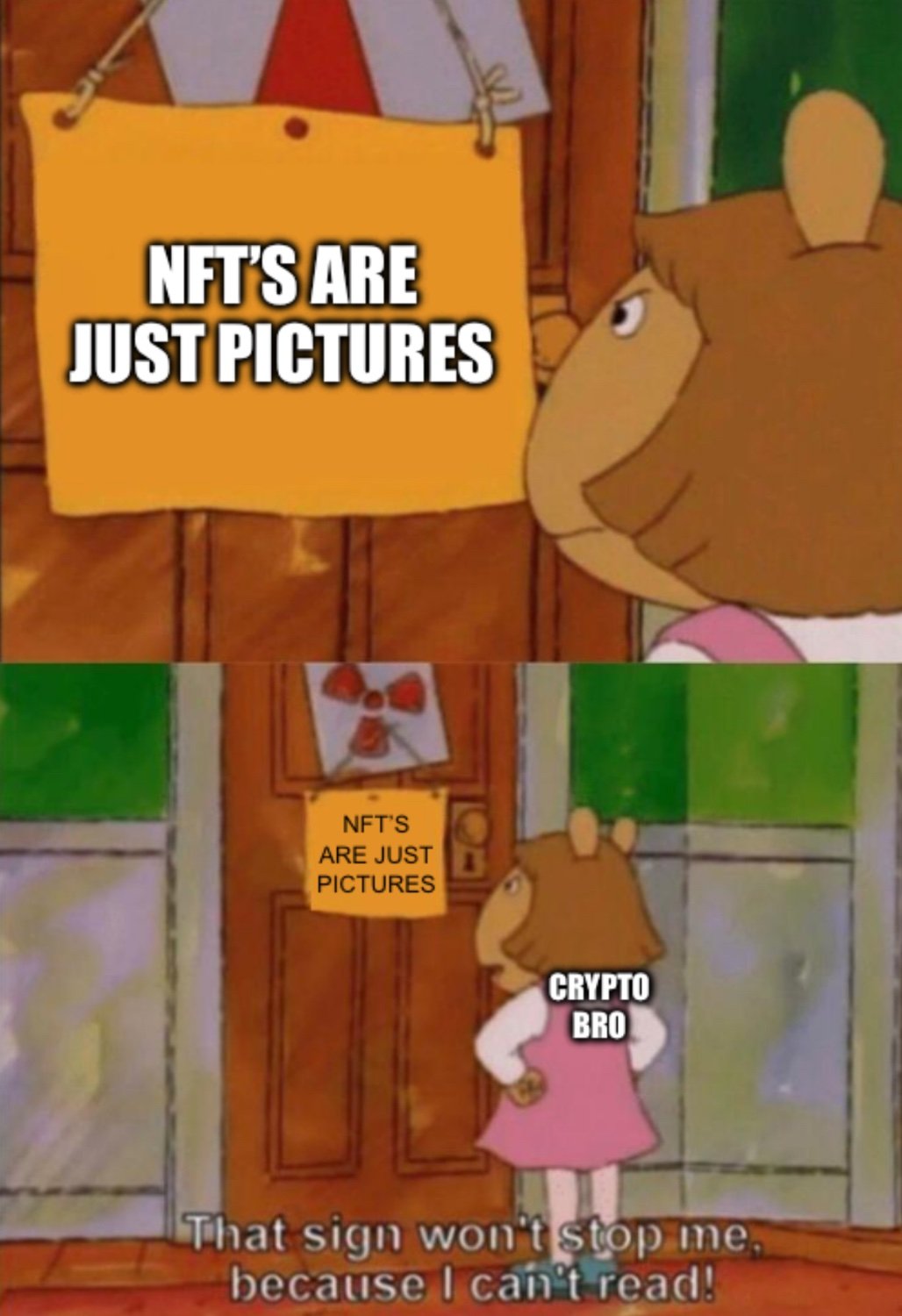755
you are viewing a single comment's thread
view the rest of the comments
view the rest of the comments
this post was submitted on 10 Nov 2023
755 points (95.6% liked)
Memes
54323 readers
443 users here now
Rules:
- Be civil and nice.
- Try not to excessively repost, as a rule of thumb, wait at least 2 months to do it if you have to.
founded 6 years ago
MODERATORS

I think NFT's had some promise for stuff you actually have to own (not some ape pictures). Like a digital version for maybe an invitation or tickets or if done properly (by your countries government for example) maybe even for stuff like licenses (i.e. driving license, welding license etc.) Or identification (passport, id, etc.)
For government documents you need nothing but a plain old certificate to create a digital signature. If there is a single instance of trust (such as a government) there absolutely no point in using a blockchain.
Decentral NFTs for concert tickets would only make sense if you were looking for a solution to liberate the second market, i.e. people selling tickets to other people without involvement of the host of the concert. Such a model is neither beneficial for the hosts (as they wouldn't benefit from the second market sales) nor the visitors (as the second market typically leads to even higher prices). If you meant a way to return/trade tickets on a platform controlled by the host / the original issuer of the tickets, then there's again no need at all for crypto aside plain old, stupid certificates.
Even in single instances of trust there can be advantages to using blockchain for those applications:
There are some fringe benefits for blockchain but massive issues with normal human issues like:
Scams/theft: person has the wallet lost through scam or left, how do you invalidate the lost credentials or tickets.
Wallet loss: loss through any number of means: fire, incompetence, computer being destroyed, loss of account to cloud backup etc
Issuer need to invalidate: if tickets/credentials were purchased by fraud or an issue occurs where they need to invalidate
How does blockchain handle these common situations?
In these examples, we are talking about credentials issued by a central authority. That authority can re-issue new credentials and invalidate old ones. Easy peasy.
If we're talking about the risk that people have their crypto stolen in general, yes it does carry that risk same as cash. There are several strategies to mitigate this: people can park larger amounts at institutions if they want or they can use things like multi-sig wallets. You have one smaller pot of money which is your everyday spending wallet which you (or somebody who gains access to it) can spend from whenever you want, and one which is "multi-sig" meaning at least one of your trusted friends/family members/etc also has to sign off if money moves out of that account. You can have multiple people on the multi-sig wallet and set the rules for example 2 of 5 friends or what have you. You wouldn't leave $10,000 in your phone's mobile wallet just like you wouldn't carry a briefcase with $10,000 in cash on the subway. Small money in your spending wallet, big money in your multi-sig.
This is similar to how one stores money normally. You have some cash in your wallet and you put the rest in a bank. In order to withdraw significant money from your bank account, the bank is going to undertake some kind of investigation to make sure it's actually you. This might be checking your ID at the teller for example. They might also include some type of fraud guarantees where they will cover any losses you experience. That kind of a system is not incompatible with blockchain and I expect with time industries will appear to mitigate these kinds of risks from an insurance perspective.
Also, generally speaking, no system is going to completely eliminate theft and fraud. 99% of the fraud and theft committed over human history has been done using traditional currency, including the kinds of fraud that aren't even called fraud because the "right people" are doing them like bank bailouts or market manipulation. Even highly-credentialed systems like Paypal are rife with fraud, ask any ebay seller. So we can't expect crypto or any other technology to eliminate it either, there will always be some. The best we can do is try to find technological, social, and educational methods for reducing it.
Same risks as cash, multi-sig or institutional holdings as explained above can solve this.
Same as answer 1
The downtime issue for identities is already solved with a government certificate and distributed certificate revocation list. As long as multiple independent parties are mirroring the government’s list, taking down the government servers would not affect identity verification. Certificate Transparency solves the CA compromise problem since you have a log of all issued certs.
Every single one of the examples you gave relies on some single centralized authority to give it value. Passports and licences are meaningless without a government. Tickets rely on the venue.
I have not heard anyone mention any application for NFTs that would work better than a database run by the agency that is required to give the document value.
Blockchain is a solution in search of a problem.
The problem IS the centralized authority. Can you forever trust a government to not artificially inflate or deflate the value of a currency? The whole point was to have a system with no single authority. No single point of failure.
It is, however, not perfect. The volatility, limited number of transacrions per second , and reliance on an incredible amount of energy expense were the largest of these when the original bitcoin concept was created. Some of these issues have solutions, but its still an evolving technology.